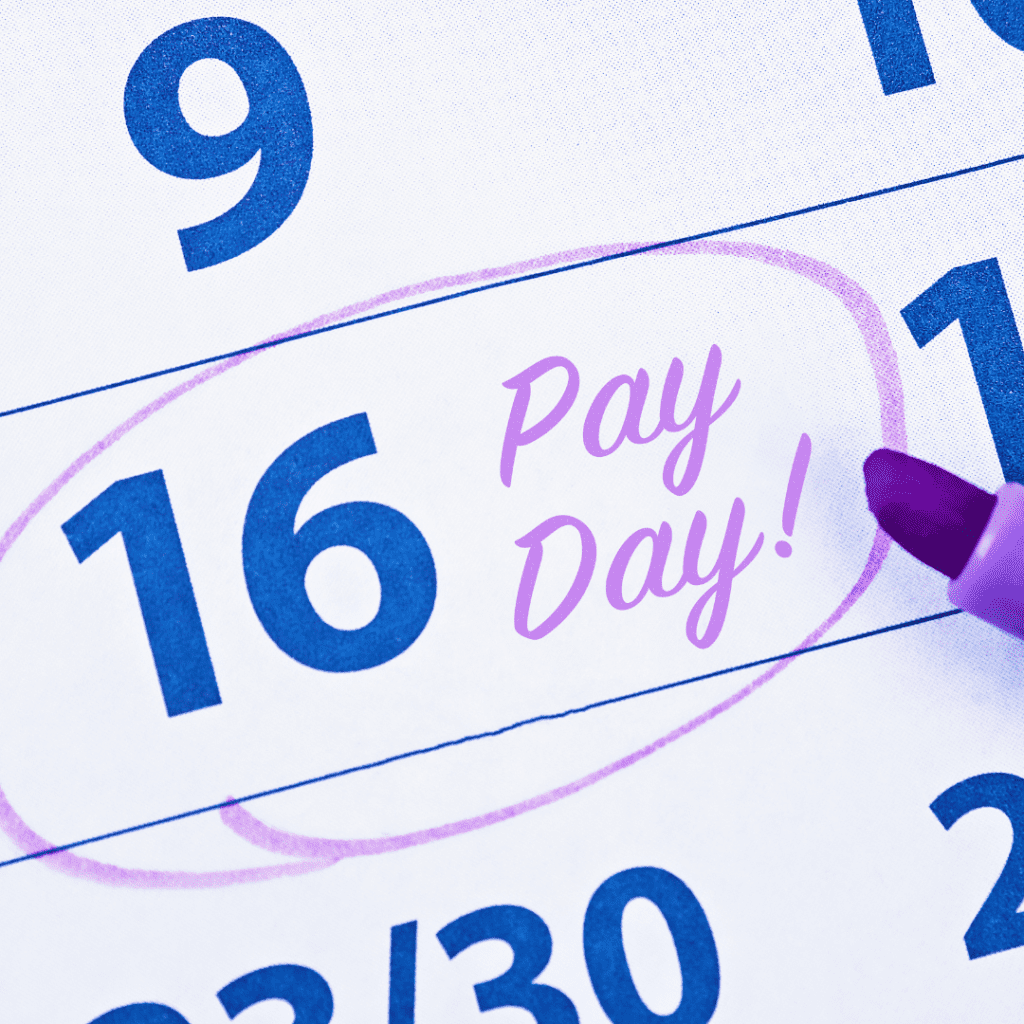All the Common Myths about Budgeting
Budgeting is really a very simple process of determining where and how you will spend your money, but yet these budgeting myths pop up all the time.
A budgeting myth is typically a principle that is taken out of context or is just misunderstood. Budgeting is a process and not a single action, so along the process these myths either become revealed or are excuses as to why the budget process is not going smoothly.

1. Budgets are set in Stone
Budgets that are made once and left alone would be so much easier to deal with on a monthly basis. Unfortunately, budgets are not a set it and forget it process.
In order for a budget to be successful long term it has to shift and adjust as priorities and commitments change. Every budget comes with short-term goals and long-term goals, so as short-term goals are accomplished new goals are implemented.
Budgets are basically a fluid plan that adjusts to circumstances in your life. As your kids get older, they may no longer need full time day care. After you pay off your car loan, you can now allocate the money to another debt.
The most successful budgets are done repeatedly over time and change to accomplish more goals. If you were to set up one budget and not change it over time, it is likely to mean that you did not account for short-term goals or that your long-term goals are too broad.
Even once you hit financial freedom, staying on a budget is what keeps your spending in check and ensures that your financial freedom can continue for the long term.
2. Budgets mean no shopping or fun
Have you ever heard someone say that they can’t do something or buy something because they are on a budget? This could be perceived as that person is no longer interested in spending money or having fun, but in reality, that person has made financial goals that they are determined to meet.
Would you tell someone trying to get in better shape that they should skip the gym and eat the big piece of cake? Probably not!
Budgeting can be restrictive due to high interest debts, low income, or trying to change overspending habits. Budgets can also have built in funds for shopping and fun activities.
How restrictive you make your budget will be based on your family’s circumstances. Personally, my family choose to live very frugally in order to pay off debt and free up more monthly income. Those few years of truly living a low dough lifestyle has allowed my husband to take 6 months off of work to spend more time with our kids while they are young.
It’s actually amusing how people jump to conclusions when it comes to money. Your friend is not buying a really expensive coat because she is must be broke now. Or my husband must have lost his job because why else would he not go to work for 6 months.
Personal finances are personal to each person, family, and situation. Very rarely does even your closest friend tell you everything they spend their money on and why.
It is best not to assume you know everyone’s financial situation. Some of the people you just know are super wealthy may have a huge amount of debt. CNBC found that Americans with a net worth over $100k are more likely to have credit card debt than those worth less.
Lifestyle creep is a real issue for some families that grow their income and then continue to increase their lifestyle costs. Just because someone makes more money, doesn’t mean they have a better financial situation compared to those that make a lower income.

3. A High Networth is the Goal
Speaking of net worth, this new idea keeps popping up that you must reach a certain value of net worth to be successful. I’m not sure why this number is causing people to panic so much.
To figure out your net worth, you simply add up all your assets like cars, house, and physical things that you own. Then you subtract all your liabilities, these are debts like car loans, credit cards, student loans, and mortgages. This number left over is your net worth.
Most of us hope that we end up with a positive number, but at certain times people will have a negative net worth. For example, some one that has just started an entry level job in their career field after graduating college with student loan debt will probably have a negative number.
If you have a home worth less than you paid for it, you could end up with a negative net worth. This is a rising fear with the higher costs of home prices right now. We know that a house worth $100k a few years ago may be worth $175,000 right now in this seller’s market. So, if you purchase this house at the height of it’s value, it is possible that in a few years, your house may be worth much less if the real estate market falls again like it did before.
Your net worth can also be high due to investments in the stock market or retirement accounts. Unfortunately, investments can also lose their value. Just because your investments are worth $300k today doesn’t mean the market won’t change and your investments are losing money. Just ask anyone that lost a ton of money in the stock market and their retirement accounts a few years back.
Net worth can be a great metric to measure your growing success but just like how the weight on the scale won’t tell you how healthy you are, your net worth will not tell you how financially successful you are.
Our net worth is less than the average net worth of Americans in 2019 which was $122,000. We make significantly less that the 2019 average yearly income of $68,703, but we have far less than the average debt of $90,460. (Debt includes mortgages, student loans, and consumer debt)
I would consider our family to be very successful financially, but if I compare our numbers to others I may want to start only focusing on the numbers. When you chase numbers on a scale or in your net worth, you are really focusing on the end and not noticing the right now.
We live a great life and have freedom to do what we like with planning. The best part is that we don’t fear unexpected expenses or worry about creditors calling.
4. Budgets Work Right Away
On average it can take at least 3 months for a budget to “work”. By working I mean that you feel comfortable in how you spent your money. You may forecast that you will only spend $27 at the grocery store every week, but you may find out that is just not achievable for your family situation.
It takes a few months to truly see how much you spend in each category and then another few months to make habit changes to spend less or to save more. So many of us have been spending our money on autopilot for so long, that when we truly look at where we spend our money on, it takes some adjusting.
For instance, my husband has been taking a multivitamin for years because he thought it was essential. We had a blood test done and found out that he doesn’t even need a multivitamin. All those months of spending money on vitamins for no health benefit. (To find out more on how to save money on vitamins, read “Are Dollar Store Vitamins any Good?”)
The more we budget and make financial planning a priority, we can become more informed about our money and make it work better for us. Budgeting is a fairly simple process, but we do have to keep working on it. It would be extremely rare to excel at budgeting from the very beginning.

5. You can’t budget irregular income
This is one of my favorite excuses for why budgeting doesn’t work. Having an irregular or ever changing income really has no effect on a budget, it just changes the way you budget.
Small business owners or those that are self-employed like free-lancers, hairdressers, and real estate agents all have variable income. They can have huge income months and zero income months.
A budget is a plan for paying bills, saving money, and getting rid of debt. Technically how much income you have every month is not relevant. It is definitely easier to at least have an idea of how much money you will take home every month, but it isn’t a budgeting deal breaker if you can’t predict your income.
One of the easiest ways to budget with an irregular income is to either know your base or median pay and base your budget on that. Or another option is to reverse budget.
A reverse budget works by determining how much money you will need every month instead of planning the money that you will make. If you determine that you will need $2500 minimum every month to pay your bills and accomplish your goals, then every month you will take your income and put $2500 aside to pay your budget plan. Anything you make above $2500 will be put aside to pay for the lower income months in a separate savings account.
A reverse budget is similar to having an emergency fund with 3-6 months of expenses, but one big difference is that if you have an irregular income, you will need both. Depending how low and high your income can swing, it would be best to have a 3-6 months emergency fund that you don’t ever touch except for true emergencies, and then also have another 3-6 months of surplus income to use for low income months.
Once you have an emergency fund and a surplus income fund established you can take any extra money every month and pay off debt, save for future expenses, or invest it. The key to making this work is that whenever you withdraw money from the surplus income fund, you immediately start replacing it with the next time you get paid more than your monthly budget plan, until it is back up to fully funded.
6.You have to invest in your Employer 401K
401k accounts have been confusing people for decades. In the US only 50% of employers offer some type of retirement account. If you work for a small business this number goes down to 33% offer a retirement account.
So what do you do when your employer just doesn’t offer a 401k? Or what if you are self employed?
You can start a solo 401k or you can start an IRA (individual retirement account) with so many different banks and brokerage firms. Now you can even start an IRA with an app on your phone.
Don’t let your employer not offering an investment account be the reason you are not saving for retirement.
7.Credit Card Rewards are always worth it
Credit cards are not good or bad by themselves, it is how we use them that can make them have a negative or positive affect on our finances. Credit card rewards are a marketing tactic by lenders to get you to choose them as a lender for your credit needs.
Only 33.7% of Americans actually pay off their credit card balances every month, so that means the other 66% are money making machines for the credit card companies. If you are using a card simply to gain rewards but are carrying a balance forward every month, then you are not winning.
The only way to get rewards and not pay interest to the credit card company, is to pay your balance in full every month. If you currently have any credit card debt, your focus should be to pay it off and not to gain rewards or cash back.
Why do credit card companies even offer rewards like cash back and airline miles? Simple! This is a clever way for you to rack up debt and get a reward for your hard spending. In reality, the amount of money that credit card companies pay out on rewards is a very small percentage compared to how much they make in interest every month.
If you are responsible with your credit card and don’t ever carry a balance (meaning you pay it in full every month) then it can definitely be worth the few perks of rewards. If you tend to use your credit cards for unnecessary spending and carry a balance, then those rewards are actually just costing you money.
It’s the same concept of using a store rewards card to get an additional 30% of your total purchase. If you go nuts at a store just so you can get an extra 30% of your total, and then don’t pay the balance off the interest that is charged on that card will basically turn your good deal into a dud. You will end up paying way more on your purchase and that initial 30% savings will disappear very quickly.
If you tend to overspend on your credit cards or in general, you may want to read this article “Why does spending money feel good?” to get some tips on curbing your overspending habits.

8. Must have a Credit Card to have a Good Credit Score
This myth must have been started by a credit card company, but yet every year people believe that you must have a credit card in order to have a good credit score. Credit cards are not the only accounts that are reported to credit agencies like TransUnion and Equifax.
Did you know that just by having a phone bill or federal student loan in your name will start a credit history? Of course, any other loans like a personal loan, car loan, or mortgage will also get reported every month.
If you don’t have any credit history, then getting a credit card is usually an easy way to start establishing a good credit score, but there are other ways. Being an authorized user on someone else’s account can help establish a credit history and a good payment history, while not actually taking on any debt yourself.
Being an authorized user is a great option if you are a stay-at-home mom without an income from an employer. By being an authorized user on your spouse’s account, you can benefit from that card even if you never use it. Typically, if you do not have an earned income from an employer, you cannot get a credit card in your own name by yourself. You will normally need a co-signer in those scenarios.
If you already have a credit score that is lower than you like, adding new credit cards will up your debt-to-income ratio, but it will also temporarily lower your credit score due to new inquiries. If you are not looking to make a big purchase on credit in the near future like a car loan or mortgage, then your credit score may not even be a really big deal.
In some cases though, if you want to work for a financial company like a bank or mortgage broker, a low credit score can actually keep you from getting a job or promotion. Financial companies have started requiring an above average personal credit score before you can work for them. This keeps a level of high integrity for their business.
If your score is low and you want to improve it, just know that there is no quick fix to your credit score. Establishing a pattern of good credit worthiness takes time. Also, any company that you pay to improve your credit score is a waste of money, because everything they do on your behalf can be done for free by yourself.
9.Budgeting means always saying No
Budgeting does not mean always saying “No!” Budgeting means making wise buying decisions and focusing on your financial goals.
You may start saying “No” more often if you are trying to break overspending habits or focusing on debt repayment, and that is okay!
We all have to start somewhere to establish a good financial foundation. Saying “no” more now, can help you say “yes” more in the future. Budgeting for fun activities, outings, and shopping are perfectly fine if you can afford them.
Preplanning money for fun or expenses like vacations are totally fine and a great way to keep you from going into further debt. Establishing a side hustle to pay for extra fun is also a good plan.
Budgeting Myths are Excuses or Reasons to give up
No one has every said that making a budget and sticking to it is easy. If budgeting were so easy, everyone would do it!
If you look at the averages in America on debt balances and overdraft fees, you will notice that there are tons of adults that just don’t budget. By not having a budget, you will never truly know where your money goes.
A budget is simply a plan or roadmap to get you to your financial destination. That can be as simple as making sure your bills are paid every month or can be the legwork to investing for retirement.
The act of budgeting can be easy once you practice and get the hang of it, but it is a muscle that has to continue to be flexed over and over again.
If you look at the number of celebrities that make huge incomes and how many times they have had to file for bankruptcy, you will start to realize that having more money does not mean less problems. If you don’t know where your money is going and just assume that you have enough money, you too could end up in bankruptcy.
If you spend more than you make, you will create a debt mountain that you will carry around with you forever. Just because debt falls off your credit score after 7 years, doesn’t mean it disappears! At the end of 7 years you can still be sued by your lender and then have your wages garnished to pay back your debt.
A budget in its simplest form will keep you from spending more than you make. This principle will keep you from going further into debt. Being in debt will not only take away chunks of your monthly income, but it can also cause so much added stress to your life.
Check out this “Super Easy Beginner Budget” to get started on your financial journey! Keep track of your spending and make “Wise Buying Decisions.” Make sure you have an Emergency Fund established and keep learning about finances to further your journey.







